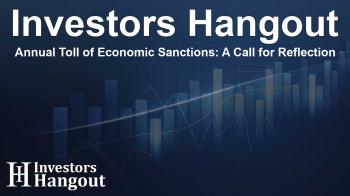Annual Toll of Economic Sanctions: A Call for Reflection

Understanding the Lethal Impact of Economic Sanctions
A significant study published in The Lancet Global Health highlights the devastating consequences of unilateral economic sanctions. The researchers estimate that these sanctions result in approximately 564,000 excess deaths each year across the globe. This staggering statistic emphasizes the severe human toll of economic policies often overlooked in public discourse.
Key Findings of the Study
The research, conducted by economists from the Center for Economic and Policy Research (CEPR), including Mark Weisbrot and Francisco Rodríguez, utilizes a comprehensive dataset that analyzes age-specific mortality rates in relation to sanctions across 152 countries from 1971 to 2021. Their findings suggest a direct correlation between the imposition of sanctions and increased mortality rates, particularly affecting vulnerable populations.
The Impact on Children
One of the most alarming revelations from the study is the impact of sanctions on children. It was found that children under five years old account for 51% of the total deaths linked to sanctions. Over the decades, a large proportion of these fatalities involve individuals aged 0 to 15 and those between 60 and 80. The implications for families and communities are profoundly tragic.
Types of Sanctions and Their Consequences
The study draws a distinct line between unilateral sanctions, often imposed by the USA and the EU, and multilateral sanctions sanctioned by the United Nations. It suggests that unilateral sanctions tend to be more lethal due to their design, which may not always consider the humanitarian needs of civilian populations.
As the authors indicate, many of these unilateral measures have been enacted with the intent of compelling political change; however, they often fail to bring about the desired outcomes. In most instances, they lead to significant suffering for the targeted countries' civilians rather than achieving positive political reform.
The Case of Venezuela and Other Nations
Venezuela has emerged as a poignant example of the destructive effects of economic sanctions. The sanctions imposed, particularly by the United States, have contributed to a substantial economic collapse in the country. These sanctions cause widespread strife not only by crippling economies but also by exacerbating pre-existing inequalities, making recovery increasingly difficult.
A Growing Trend in Sanctions Usage
Despite the clear humanitarian repercussions outlined in the study, the usage of economic sanctions has surged in recent decades. Statistics show that between 2010 and 2022, around 25% of all countries have been under some form of sanctions, a steep increase from only 8% during the 1960s. This escalating trend underscores the need for a critical reassessment of such policies, particularly given their profound effects on innocent civilians.
Time for Reconsideration
This alarming data calls into question the morality and effectiveness of economic sanctions as a policy tool. As highlighted by the authors, it is essential for policymakers to reconsider the continuation of such punitive measures, which often do more harm than good. The suffering imposed on civilian populations begs for a shift in strategy towards more ethical approaches that prioritize human well-being.
Frequently Asked Questions
What is the main finding of the study published in The Lancet?
The study estimates that unilateral economic sanctions lead to around 564,000 excess deaths globally each year.
Which population is most affected by economic sanctions?
Children under the age of five comprise over half of the deaths attributed to these sanctions.
How do unilateral sanctions compare to multilateral ones?
Unilateral sanctions, particularly those imposed by the USA and EU, tend to have a more significant negative impact on civilian populations compared to multilateral sanctions imposed by the UN.
What is the historical trend in the use of economic sanctions?
The use of economic sanctions has increased dramatically, with 25% of countries facing sanctions from either the USA, EU, or UN recently, compared to just 8% in the 1960s.
What is the urgent call to action by the study's authors?
The authors urge the US, EU, and other global leaders to re-evaluate the persistent use of economic sanctions, given their detrimental effects on civilian populations.
About The Author
Contact Olivia Taylor privately here. Or send an email with ATTN: Olivia Taylor as the subject to contact@investorshangout.com.
About Investors Hangout
Investors Hangout is a leading online stock forum for financial discussion and learning, offering a wide range of free tools and resources. It draws in traders of all levels, who exchange market knowledge, investigate trading tactics, and keep an eye on industry developments in real time. Featuring financial articles, stock message boards, quotes, charts, company profiles, and live news updates. Through cooperative learning and a wealth of informational resources, it helps users from novices creating their first portfolios to experts honing their techniques. Join Investors Hangout today: https://investorshangout.com/
The content of this article is based on factual, publicly available information and does not represent legal, financial, or investment advice. Investors Hangout does not offer financial advice, and the author is not a licensed financial advisor. Consult a qualified advisor before making any financial or investment decisions based on this article. This article should not be considered advice to purchase, sell, or hold any securities or other investments. If any of the material provided here is inaccurate, please contact us for corrections.

